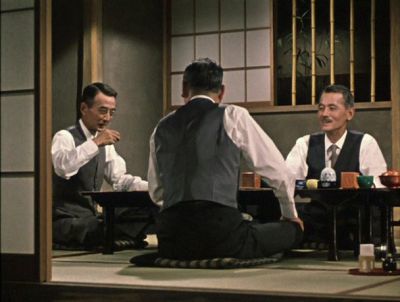
SANMA NO AJI
(Il gusto del sakè, Giappone/1962) R.: Yasujirô Ozu. D.: 133'
Introduce Ichiro Yamamoto (Shochiku Co.)
T. it.: Il gusto del sakè. T. int.: An Autumn Afternoon. Scen.: Kugo Noda, Yasujiro Ozu. F.: Yoharu Astuta. M.: Yoshiyasu Hamamura. Scgf.: Tatsuo Hamada. Mus.: Kujun Saito. Int.: Shima Iwashita (Hirayama Michiko), Chishu Ryu (Hirayama Shuhei), Keiji Sata (Koichi), Mariko Okada (Akiko), Shun'ichiro Mikami (Kazuo), Teruo Yoshida (Miura Yutaka), Noriko Maki (Taguchi Fusaku), Nobuo Nakamura (Kawai Shuzo), Eijiro Tono (professor Sakuma) Toyo Takahashi (padrona del ristorante), Ryuji Kita (Shin Horie). Prod.: Shizuo Yamanouchi per Shochiku Company. Pri. pro.: 18 novembre 1962 DCP. D.: 133'. Col. Versione giapponese con sottotitoli inglesi / Japanese version with English subtitles
Da: National Film Center - The National Museum of Modern Art, Tokyo
Restaurato digitalmente da / Digital restoration by Shochiku Co., Ltd., the National Film Center and the National Museum of Modern Art in Tokyo
In Il gusto del sakè, Toyo Takahashi interpreta la padrona del piccolo ristorante dove Chishu Ryu e Nobuo Nakamura hanno appuntamento con Ryuji Kita. I primi due la punzecchiano ed evocano Kita che, avendo sposato in seconde nozze una giovane donna, potrebbe morire di sfinimento. Toyo Takahashi rimane silenziosa. Appare allora Ryuji Kita, che sorride con modestia. Il respiro della sequenza è di una singolare comicità, in ragione del ritmo a effetto ritardato tipico di Ozu. Quando si pensa che questo film è l'opera-testamento di Yasujiro Ozu, si finisce per cogliere anche in questa comicità una certa tensione. [...] Dal momento che nello spazio sacro degli uomini appare la sua giovane moglie, Ryuji Kita prende co- scienza di aver trasgredito il tabù, rimane turbato e abbandona precipitosamente il locale con lei. Questa partenza improvvisa offre naturalmente il destro a nuove ironie. I pettegolezzi e gli scherzi triviali degli amici nella sala privata del ristorante, pur sembrando una lunga digressione senza rapporti con l'intrigo principale, come una pausa nel ritmo narrativo, servono in realtà a insinuare un tema essenzialmente grave. Così, la camera del primo piano della casa giapponese nell'ultimo Ozu, è l'esatto corrispettivo della sala privata del ristorante, dominio degli uomini. Come la sala del ristorante, che è uno spazio quasi astratto, tagliato dal mondo esterno, la sala del primo piano è separata dallo spazio della vita [...]. Se la prima è caratterizzata dall'esclusione dell'elemento femminile, il dominio sacro delle donne rifiuta ogni presenza maschile.
Shiguehiko Hasumi, Yasujiro Ozu, Collection Auteurs - Cahiers du cinéma, Paris 1998
In An Autumn Afternoon, Toyo Takahashi plays the owner of a little restaurant where Chishu Ryu and Nobuo Nakamura have a meeting with Ryuji Kita. Chishu and Nobuo tease Toyo and call Kita who, having got married for the second time, to a young woman, might well die from exhaustion. Toyo Takahashi keeps silent. Ryuji Kita appears, smiling modestly. The spirit of the sequence is a unique comedy, due to the rhythm with a delayed effect that is typical of Ozu. This is the film that is a testament to Yasujiro Ozu: it is able to gather a certain tension even with it being a comedy. [...] From the moment when the young wife comes into the men's sacred space, Ryuji Kita becomes aware that he has broken the taboo; he is left troubled and quickly leaves with her. This sudden departure naturally offers the opportunity for new irony. [...] The friends' trivial gossip and jokes in the private room of the restaurant even seem to be a long digression with no relationship to the main plot, like a pause in the narrative rhythm. Instead, they are there to allude to the fundamentally serious theme. The room on the first floor of the Japanese house in the final Ozu film is the exact equivalent of the private room in the restaurant (the men's domain). Like the room in the restaurant, which is almost an abstract space, cut off from the outside world, the room on the first floor is separated from the living space [...]. If the first room is characterized by the exclusion of a feminine element, the women's sacred space eschews any male presence.
Shiguehiko Hasumi, Yasujiro Ozu, Collection Auteurs - Cahiers du cinéma, Paris 1998

Tariffe:
Aria condizionata
Accesso disabili
Tel. 051 522285











